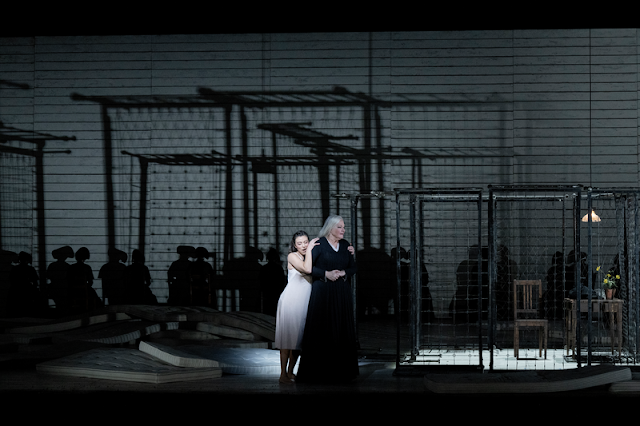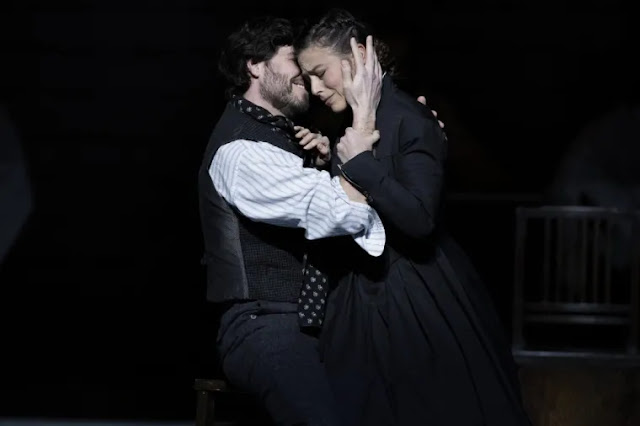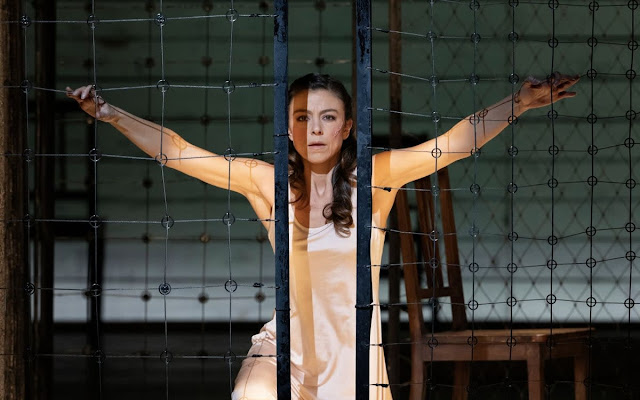 |
| Janáček: Jenůfa – Corinne Winters, Karita Mattila – Royal Opera (Photo: Camilla Greenwell/RBO) |
Janáček: Jenůfa; Corinne Winters, Karita Mattila, Nicky Spence, Thomas Atkins, Hanna Schwarz, director: Claus Guth/Oliver Platt, conductor: Jakub Hrůša; Royal Opera House
Reviewed 1 February 2025
With the company’s incoming music director in the pit and a strong ensemble cast, this was an evening to remember with powerful performances from both soloists and orchestra, despite Claus Guth’s somewhat disappointing production
Claus Guth‘s production of Janáček’s Jenůfa returned to the Royal Opera House for the first time since it was new [see my review from 2021] with many of the same cast. We caught the final performance in the run on 1 February 2025. Oliver Platt was the revival director, with Jakub Hrůša, the company’s incoming music director, in the pit. Corinne Winters sang Jenůfa, with Karita Mattila and Nicky Spence returning as the Kostelnička and Laca, plus Thomas Atkins as Števa, Hanna Schwarz as grandmother, James Cleverton as the foreman, Jonathan Lemalu as the Mayor and Marie McLaughlin as the mayor’s wife.
One noticeable, and welcome thing about the casting was its use of distinguished older female singers encompassing Karita Mattila, Hanna Schwarz and Marie McLaughlin with birth dates varying from 1960 through to 1943.
Seen second time around, Guth’s production remains somewhat disappointing. In the first act there is little sense of who these people are, of community. If one reads the play on which the opera is based, set in an isolated Moravian community, then Jenůfa would face death by stoning if her pregnancy was discovered, not simply social embarrassment.
Guth, however, relies not on character but on symbols. Do we really need the blood-covered young boy walking across the stage at the beginning of Act Two, and as for the large crow which appears during Števa’s scene in that act, what is that for. And whilst first time around, I found it imaginative the way the Kostelnička’s house was made from the iron bedsteads from Act One, this time I simply grew frustrated that we watched the singers’ faces through a gauze of metal mesh.
 |
| Janáček: Jenůfa – Thomas Atkins, Corinne Winters – Royal Opera (Photo: Camilla Greenwell/RBO) |
What made this revival special were the performances. Key amongst these was that of Jakub Hrůša and the orchestra. Because Hrůša is Czech we cannot simply assume that he has the music in his DNA but certainly that applies here. Always in Janáček’s operas the orchestral contribution is key, but here Hrůša turned them into another character, one that brought every scene to life. There was a particular intensity about the playing, not excessively loud, yet wonderfully alive and powerful. The moments of lyrical tenderness, the few that there are, were finely done, the final melody when Jenůfa and Laca were alone at last was achingly beautiful yet not sweet. Superb stuff, and I cannot wait to hear what Hrůša does next with the company.
In the title role, Corinne Winters had a slim-line, laser-focused voice that grew in intensity as the screw twisted on Jenůfa. For my taste, I found her vocally a little too slim-line, I was brought up on sopranos with more refulgent tone in smaller theatres. In Act One, the production made Jenůfa stiff and unresponsive rather than the proud beauty. Winters ran with this, making Jenůfa unbending and almost a mirror of her step-mother. Only warming when Thomas Atkins’ carelessly seductive Števa was around. But once we reached Act Two, her intensity became almost unbearable, and then in Act Three the control seemed to reach the point where she might shatter, and it was here that Nicky Spence’s sheer warmth as Laca counted so that the end was truly magical, and for once it the vocal performance were complemented by the orchestra.
Vocally, the Kostelnička is not an ideal fit for Karita Mattila. The most memorable incarnations of the role for me have been dramatic sopranos; in the middle range Mattila lacked the cutting edge, and the upper notes often felt squeezed out. But yet, but yet, but yet.
This was a truly chilling performance, with Mattila bringing out the woman’s rigid discipline and sense of self-control. She made you understand visibly from her first major appearance in Act One. We do not get Kostelnička’s Act One solo about her late husband in this version; it holds up the action horribly, though does provide background. But Mattila conveyed everything you needed. By Act Two we could see a woman held together by sheer will so that her collapse in Act Three was part of a dramatic arc. Mattila and Winters made the end of Act Two almost unbearable in its dramatic intensity.
Nicky Spence was a wonderfully expansive Laca, his all encompassing tone make you understand the way he could support Jenůfa at the end, his jealousy and impulsiveness all part and parcel. Spence made Laca more personable, more approachable than some, but it is important to remember that this is an opera where all the protagonists are damaged in some way, and the tentative nature of Jenůfa and Laca’s relationship in Act Three brought this out, with Spence treating Winters as if she might shatter.
Thomas Atkins blew in wonderfully as Števa, a casual gust of self-centred breeze who was careless of all those around him. Atkins’ Števa was not nasty, he just wanted an easy life centred on his own pleasure, and his scene with Mattila’s Kostelnička in Act Two was masterly.
The smaller roles were well taken. In Act One, Hanna Schwarz was wonderfully vicious as Granny, you forget quite what a nasty character she is, perhaps coming of having to run the mill without any male help in a male-dominated society. James Cleverton as a strong foreman, giving this relatively small but important role a depth of character, whilst Jonathan Lemalu bumbled magnificently as the Mayor with Marie McLaughlin on magnificent form as his lofty wife. Valentina Puskás was engaging as their daughter Karolka, with Kirsty McLean as Jana.
 |
| Janáček: Jenůfa – Corinne Winters – Royal Opera (Photo: Camilla Greenwell/RBO) |
With Hrůša in the pit this revival was always going to be something special, and this strong ensemble cast drew out Janáček’s piece into an intense and tense evening.
The blog is free, but I’d be delighted if you were to show your appreciation by buying me a coffee.
Elsewhere on this blog
- Schubert’s Birthday at Wigmore Hall: Konstantin Krimmel in overwhelming form, with a welcome group of Carl Loewe too – concert review
- Bruckner’s obsession with death, Scottish Gaelic folk poetry & a grumpy gaboon: Scottish composer Jay Capperauld, Scottish Chamber Orchestra’s associate composer – interview
- Letter from Florida: a study in contrasts, Gounod’s Roméo et Juliette at Palm Beach Opera – opera review
- 1775 – A Retrospective: Ian Page & The Mozartists on terrific form in a deep dive into the sound-world of Mozart’s 1775 – concert review
- Canadian composer Jacques Hétu’s final symphony in a new recording with three of Canada’s major ensembles – record review
- Personal night time musings & reflections: Eight Nocturnes from violist & composer Katherine Potter commissioned by ABC Classic – cd review
- Reynaldo Hahn looks back: Belle Époque in Kaleidoscope Chamber Collective’s programme centred on Hahn’s Piano Quintet – concert review
- Anna Dennis’ Susanna was rightly the main focus of John Butt & Dunedin Consort’s involving account of Handel’s neglected oratorio – concert review
- Figures outside a Dacha, with Snowfall, and an Abbey in the Background: from Andrei Tarkovsky’s Nostalghia to Steven Daverson’s new work for orchestra and live electronics – interview
- Beyond Ravel: Mathias Halvorsen comprehensively demonstrates it is well worth exploring Paul Wittgenstein’s commissions – record review
- Home









